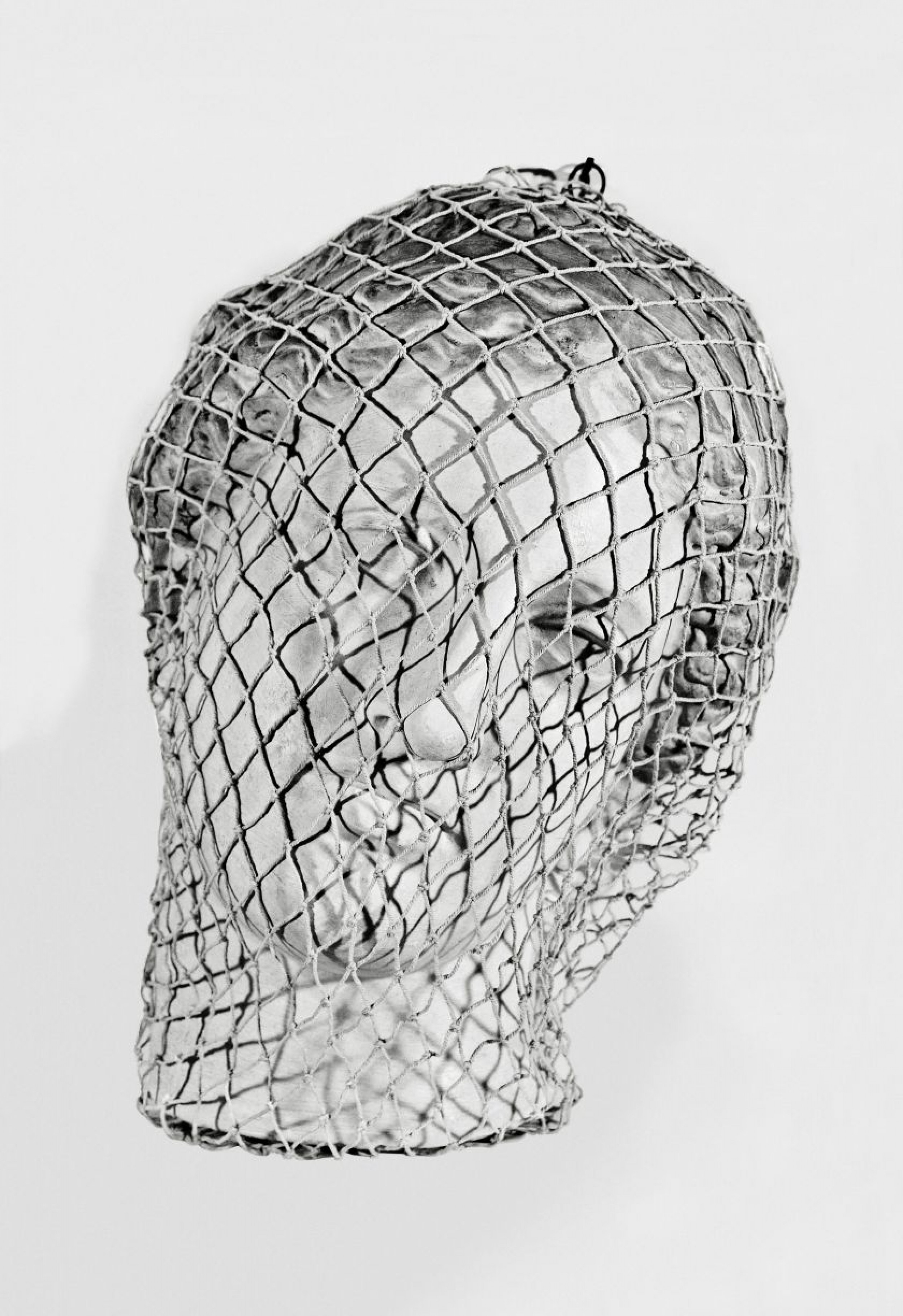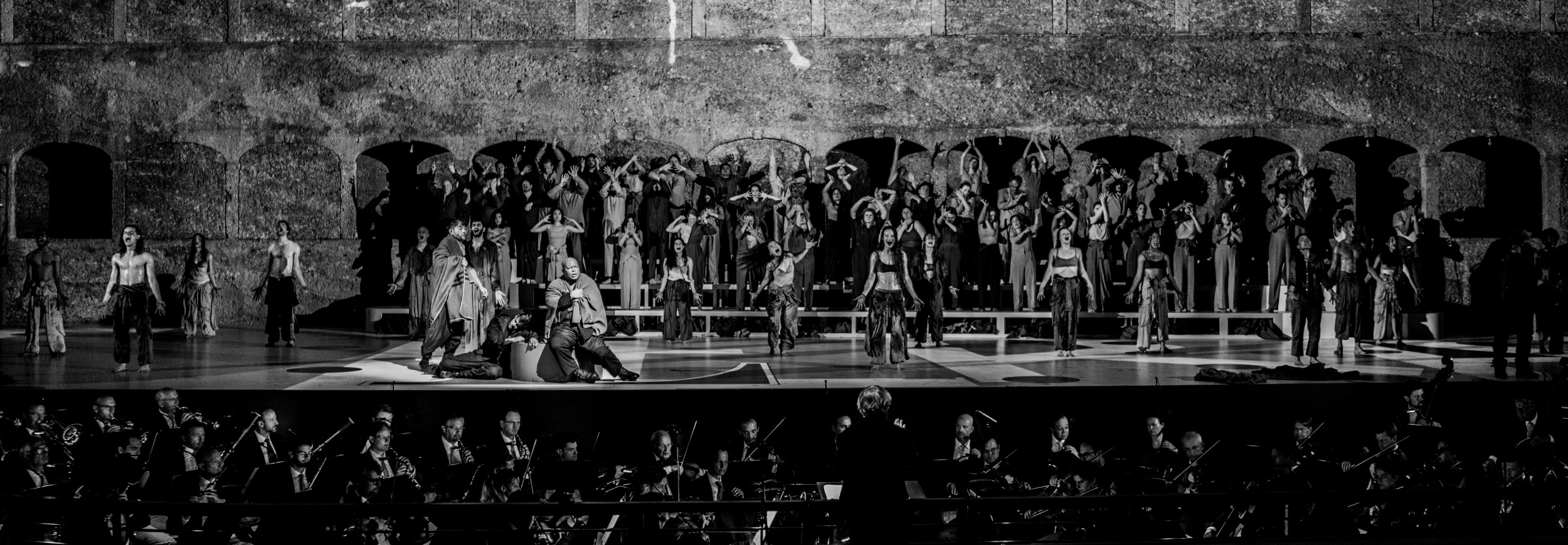INTOLLERANZA 1960
Luigi Nono (1924 - 1990)
Azione scenica in two parts (1961)
after an idea by Angelo Maria Ripellino
Libretto by Luigi Nono, based on texts by Henri Alleg, Bertolt Brecht, Paul Éluard, Julius Fučík, Vladimir Mayakovsky, Angelo Maria Ripellino and Jean-Paul Sartre
CREATIVE TEAM
Ingo Metzmacher Conductor
Jan Lauwers Direction, Sets, Choreography and Video
Lot Lemm Costumes
Ken Hioco Lighting
Paul Jeukendrup Sounddesign
Elke Janssens, Kasia Tórz Dramaturgy
Paul Blackman (jukstapoz) Choreography
CAST
Sean Panikkar Un emigrante
Sarah Maria Sun La sua compagna
Anna Maria Chiuri Una donna
Antonio Yang Un algerino
Musa Ngqungwana Un torturato
Sung-Im Her, Yonier Camilo Mejia, Victor Lauwers, Misha Downey (Needcompany) Performance and solo dance
ENSEMBLES
Dancers of BODHI PROJECT and SEAD — Salzburg Experimental Academy of Dance
Concert Association of the Vienna State Opera Chorus
Huw Rhys James Chorus Master
Vienna Philharmonic
PRODUCTION
Salzburger Festspiele & Needcompany
SUPPORTED BY
Freunde der Salzburger Festspiele e.V. Bad Reichenhall

August 2020 | ||||||||||||||||||||||||||||||||||||||||||||||||||||||||||||||||||||||||||||||||||||||||||||||||||
| 09 Aug | Salzburg AT | Salzburger Festspiele Postponed | ||||||||||||||||||||||||||||||||||||||||||||||||||||||||||||||||||||||||||||||||||||||||||||||||
| 15 Aug | Salzburg AT | Salzburger Festspiele Postponed | ||||||||||||||||||||||||||||||||||||||||||||||||||||||||||||||||||||||||||||||||||||||||||||||||
| 23 Aug | Salzburg AT | Salzburger Festspiele Postponed | ||||||||||||||||||||||||||||||||||||||||||||||||||||||||||||||||||||||||||||||||||||||||||||||||
| 27 Aug | Salzburg AT | Salzburger Festspiele Postponed | ||||||||||||||||||||||||||||||||||||||||||||||||||||||||||||||||||||||||||||||||||||||||||||||||
August 2021 | ||||||||||||||||||||||||||||||||||||||||||||||||||||||||||||||||||||||||||||||||||||||||||||||||||
| 15 Aug | Salzburg AT | Salzburger Festspiele Premiere | ||||||||||||||||||||||||||||||||||||||||||||||||||||||||||||||||||||||||||||||||||||||||||||||||
| 20 Aug | Salzburg AT | Salzburger Festspiele | ||||||||||||||||||||||||||||||||||||||||||||||||||||||||||||||||||||||||||||||||||||||||||||||||
| 26 Aug | Salzburg AT | Salzburger Festspiele | ||||||||||||||||||||||||||||||||||||||||||||||||||||||||||||||||||||||||||||||||||||||||||||||||
| 29 Aug | Salzburg AT | Salzburger Festspiele | ||||||||||||||||||||||||||||||||||||||||||||||||||||||||||||||||||||||||||||||||||||||||||||||||
Ihr, die ihr auftauchen werdet aus der Flut
in der wir untergegangen sind
gedenkt
auch der finsteren Zeit
der ihr entronnen seid.
Bertolt Brecht
You, who shall resurface following the flood
in which we have perished,
remember
also the dark time
that you have escaped.
Translation Scot Horton
Intolleranza 1960 is an opera that provides more questions than answers. Can it in fact be called an ‘opera’ at all? Or does it offer a statement of much greater importance? Does it transcend its own political content when it is staged today, as Intolleranza 2021?
The Italian composer Luigi Nono (1924–1990) sought a new form of music theatre in which the voice, simultaneity and the spatial use of sound were examined and employed in a singular way. He was initially associated with the Second Viennese School (Arnold Schoenberg, Alban Berg and Anton Webern) and rejected traditional operatic conventions at a very early stage. He explored new compositional techniques, made use of recording tape and electronic music and called certain works ‘situations’ and 'azione scenica' (stage action). Such dramaturgical perception made him an innovator. His compositional outlook was fuelled very much by his political views. As a young partisan fighter, he joined the Italian communist party during the final days of Mussolini’s dictatorship, when membership was still a crime. Nono attempted to make socially-committed music that was not only expressed in aesthetic forms, but also had a direct impact on its listeners. It was crucial to him that his work was accessible to all social classes.
Nono wrote Intolleranza 1960, seen as his debut in the world of theatre, following a commission for the XXIVth International Festival of Contemporary Music at the Venice Biennale, where it had its premiere at Teatro La Fenice 60 years ago and was considered one of the most striking pieces of music in the history of the post-war avant-garde and a culminating work of Nono’s first artistic period. He wrote the Italian libretto himself, based on an idea by Angelo Maria Ripellino and documentary writings as well as poems by Julius Fučík, Henri Alleg, Jean-Paul Sartre, Paul Éluard, Vladimir Mayakovsky and Bertolt Brecht. It tells of an anonymous immigrant who returns to his native land. On his journey he finds himself in the midst of a protest and, although innocent, is arrested, tortured and imprisoned in a concentration camp. His longing for home becomes an urge for freedom. He succeeds in escaping, but then fate strikes when a tidal wave causes a humanitarian disaster.
Despite its radicalism, the progress of Intolleranza 1960 was hindered by numerous obstacles. These already started before the premiere, as his collaboration with Ripellino did not go according to plan. Nono reworked the text himself, and the then chairman of the Biennale subsequently tried to censor. The work was also attacked and disrupted by neo-fascists at its premiere.
The ‘azione scenica’ reflects Nono’s aversion to the power system and is composed of allegorical episodes that criticize everyday absurdities. It is a passionate and almost visionary protest against racism, intolerance, oppression and the violation of human dignity, with an added climatological catastrophe, that leads the opera into a very contemporary discourse. ‘Intolleranza 1960 is the awakening of human awareness in a man who has rebelled against the demands of necessity – an emigrant miner – and searches for a reason and a ‘human’ basis for life. After several experiences of intolerance and domination, he is beginning to rediscover human relations, between himself and others, when he is swept away in a flood with other people. There remains his certainty in ‘a time when man will be a help to man’. Symbol? Report? Fantasy? All three, in a story of our time’, wrote Luigi Nono.
This production of Intolleranza 1960 for the centennial season of the Salzburg Festival is unique, not only for its content, but also because Nono’s oeuvre has been performed in Salzburg over the last 30 years in exemplary performances. As a Nono expert, conductor Ingo Metzmacher underlines that ‘Nono’s work and legacy are like a guiding light that I still follow today’.* Over the past two years, Jan Lauwers has been making an intensive study of the importance of political art, which will be reflected in this new staging. ‘Political art negates the beauty of politics. Yet art is always political’, he explains.
Text Elke Janssens
* Wie is er bang voor nieuwe klanken? By Ingo Metzmacher. Translated by Anthony Fiumara, Uitgeverij Cossée, 2005. Original title: Keine Angst vor neuen Tönen.
INTOLLERANZA 1960
Luigi Nono (1924 - 1990)
Azione scenica in two parts (1961)
after an idea by Angelo Maria Ripellino
Libretto by Luigi Nono, based on texts by Henri Alleg, Bertolt Brecht, Paul Éluard, Julius Fučík, Vladimir Mayakovsky, Angelo Maria Ripellino and Jean-Paul Sartre
CREATIVE TEAM
Ingo Metzmacher Conductor
Jan Lauwers Direction, Sets, Choreography and Video
Lot Lemm Costumes
Ken Hioco Lighting
Paul Jeukendrup Sounddesign
Elke Janssens, Kasia Tórz Dramaturgy
Paul Blackman (jukstapoz) Choreography
CAST
Sean Panikkar Un emigrante
Sarah Maria Sun La sua compagna
Anna Maria Chiuri Una donna
Antonio Yang Un algerino
Musa Ngqungwana Un torturato
Sung-Im Her, Yonier Camilo Mejia, Victor Lauwers, Misha Downey (Needcompany) Performance and solo dance
ENSEMBLES
Dancers of BODHI PROJECT and SEAD — Salzburg Experimental Academy of Dance
Concert Association of the Vienna State Opera Chorus
Huw Rhys James Chorus Master
Vienna Philharmonic
PRODUCTION
Salzburger Festspiele & Needcompany
SUPPORTED BY
Freunde der Salzburger Festspiele e.V. Bad Reichenhall

Needcompany
Performers
Contact
|
work
|
tour
Full calendar
|
Publications
Books
Music
Film
|
Newsletter
Subscribe
Archive
|

















